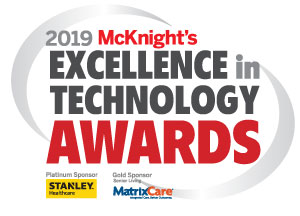
Telemedicine. A post-acute provider collaboration platform. Automation of resident activity calendars. These were just a few technologies that earned top honors in McKnight’s 2019 Excellence in Technology Awards competition.
“The award winners demonstrated the extent to which technology is making inroads in all aspects of long-term care — from resident quality of life to staff satisfaction to communication among post-acute providers,” commented John O’Connor, editorial director for McKnight’s.
Entries for the seventh annual competition were collected earlier this year and judged by an independent panel of long-term care and senior living experts. Stanley Healthcare was the Platinum Sponsor of the competition.
High-Tech, High-Touch: Redstone Greensburg
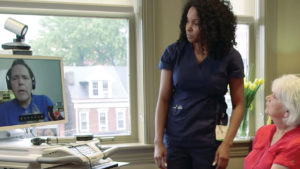
Implementing a robust telemedicine program earned Redstone Greensburg, a Pennsylvania-based rehabilitation center, the Gold Award in the High-Tech, High-Touch category.
“With increasing clinical staffing shortages, the use of [telemedicine] helps connect patients with practitioners in real time,” Jacque Bell, the facility’s director of Health Navigation, told McKnight’s. “This helps to decrease acute-care admissions and readmissions, which create risks for seniors.”
Concerned about rising readmission rates and the need to provide quality care to residents on nights and weekends, in 2017, Redstone turned to Curavi for its telemedicine expertise. Curavi’s after-hours telemedicine coverage was so effective that Redstone expanded the partnership to behavioral health telemedicine services.
The telemedicine program has brought reduced hospitalizations, improved patient outcomes and an increase in retained revenue (with more residents being treated in place, census improved) at the community.
Other High-Tech, High-Touch winners:
• Signature HealthCARE, of Louisville, KY, earned Silver for a digital platform that creates ongoing communication between medical directors, skilled nursing facilities and chief medical officers. The CareAscend app drives engagement between medical directors and SNFs and enables two-way communication for maintaining and improving the administrative, clinical and physician collaboration.
• Kaleida Health, of Buffalo, NY, won Bronze for using software that reduces hospital readmissions. Patient Pattern Inc. software helped align the hospital physicians with SNF goals and best practices for the frail nursing home population.
Safety: Bethel Pointe
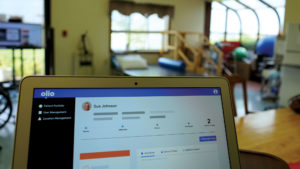
Its efforts to improve collaboration with post-acute providers helped Bethel Pointe, a skilled nursing facility in Muncie, IN, win Gold in the Safety category.
Since safety is a cornerstone of excellent care, the community was looking for ways to improve in that area. It chose Olio for a collaboration platform that allows health systems, physicians and post-acute providers to communicate and connect in real time on a patient’s condition in a single digital environment. Olio enabled Bethel Pointe caregivers to collaborate with each other and staff at the hospital to ensure each staff member has up-to-date information on each patient and his or her progress.
A key element is an “escalation” feature, which allows skilled nursing staff to “escalate” a resident via a digital alert to the resident’s physician team so they can intervene on the resident’s behalf.
“Our experience is leading to better patient outcomes,” Administrator Derek Gibson explained. “Our facility takes extremely sick patients, sometimes with more comorbidities than we can handle. When this happens, we can now communicate with the acute-care provider immediately as to what is happening with the patient and collaborate to see if the patient was possibly discharged too early or if there is something more we could do to prevent a rehospitalization.
“We fully expect the relationships with our acute-care partners to flourish for many years to come.”
Other Safety winners:
• Saint Mary’s Home of Erie, of Erie, PA, seized Silver for advancing the electronic health records in its facilities. Among the progress: It implemented interdisciplinary progress notes and eDOCs, electronic physician orders, eCharting and the Facility Dashboard. This automation has reduced the number of medication errors and keeps staff alerted to resident changes.
• Villa Healthcare, of Skokie, IL, snared Bronze for incorporating Direct Supply TELS for safety support in its 34 skilled nursing facilities. TELS uses information from maintenance industry experts and state surveyors to create a library of life safety tasks and materials tailored toward each building’s specific needs.
Innovator of the Year: R and D division, Illuminate HC
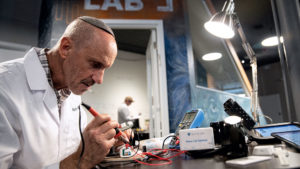
The research and development arm of Illuminate HC this year won the Gold Award in the Innovator of the Year category.
The company, which is dedicated to creating technological solutions for healthcare, previously won a Gold in 2017.
Regulations imposed on healthcare providers can seem like a roadblock to executing new processes and technologies, acknowledged Nathan Robeson, Illuminate HC’s software architect and technology solution engineer.
“If there’s one thing we hope others learn from us, it is to invest the time and resources necessary for executing new innovations that will enhance healthcare. That will make it a better industry for all of us,” Robeson told McKnight’s.
In creating the Patient Response System, the research and development lab was responding to the persistent problem of communication between residents and their family members, and skilled nursing facilities. Families often feel frustrated that the facilities are not properly addressing their requests or questions, and may feel stymied in their repeated efforts to participate in the care of their loved ones.
To address this issue, Illuminate HC developed a solutions suite that includes a communication app, known as “CATE” (short for “advocate”), through which families can make and track requests. The app is currently undergoing Amazon Echo, or Alexa, skills configuration to make the process even easier for the user. The suite also includes a Solution Center, a call center, and “get-right-through,” appointment facilitators.
Other Innovator of the Year winners:
• Fellowship Community, of Whitehall, PA, won Silver for developing a comprehensive chronic heart failure disease management program for its continuing care retirement community residents. It uses MatrixCare EHR technology to track residents through the program, document vital signs, enter data into user-defined forms, track daily weights, document a walking program and run reports to assess readmission rates. The program has resulted in decreased hospital admission rates for CHF and fewer disease exacerbations.
• RiverWoods Exeter, Exeter, NH, took Bronze for technology that makes checking on residents at night less intrusive. Using the Sensara ProCare solution, it can set personalized alarms based on the individual needs of residents. The technology sends an alarm to nurses if a resident needs support. This eliminates the need to open residents’ doors to see if they are safe.
Keep It Super Simple: Hebrew Home at Riverdale
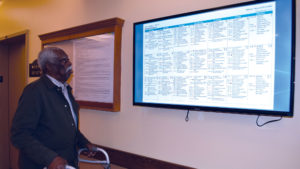
Automating resident activity calendars garnered the Hebrew Home at Riverdale in the Bronx, NY, top honors in the Keep It Super Simple category.
Implementing the system has yielded vital improvements, said David Finkelstein, CIO of the 735-bed skilled nursing facility, which has 17 different neighborhoods, or units.
“Historically, it has been a challenge to engage some residents, especially in the memory care neighborhoods, in activities,” Finkelstein told McKnight’s. “This system enables us to easily track attendance, and record photos and videos each day and share with residents and their families. This system has also saved hours of manual documentation by the staff, enabling them to spend more time with the residents.”
To execute the new calendar system, the Hebrew Home used Sagely, which enabled the community to create as many calendars as it needed. Besides providing visually appealing calendars, the system offers robust reporting capabilities, program attendance and tracking, and it allows family members to access their loved ones’ calendars.
Driving the project was Catherine Farrell, director of therapeutic arts for the Hebrew Home.
Other KISS winners:
• Avamere Rehabilitation of Eugene in Eugene, OR, earned Silver for a staffing tool that allows nursing leadership to assign CNA workloads based on resident acuity. To create the tool, Excel software was used to record staff ratings of resident acuity and then a histogram was used to determine mean staff rating for each resident.
The rating was compared to ADL scores recorded by the community’s PCC software. The final product allows nurses to make assignments quickly. Since it was implemented, grumbling about unfair assignments has ended, leaders said.
• AMFM Nursing & Rehabilitation Center in Charleston, WV, took Bronze for updating its point-of-care kiosks, med cart laptops and nurse station desktops with a consistent, manageable solution. The answer: Chrome OS-based devices, which has resulted in increased documentation, reduced IT problems and smoother operations overall.
Transitions: Bridgemoor Transitional Care
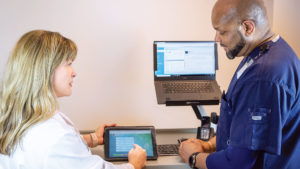
A technological embrace of value-based care helped Bridgemoor Transitional Care, which provides short-term rehabilitation following a hospital stay, win the Gold Award in the Transitions category.
“The shift to value-based care from the longstanding fee-for-service payment model is especially impactful in the post-acute care industry,” said Mark Fritz, president of Bridgemoor Transitional Care, which has four locations in Texas. “This shift has generated a market need for short-term, high-quality care for higher acuity patients. We saw this as an opportunity to create an innovative approach to post-acute care and are very pleased with the model we created.”
Bridgemoor launched a technology-enabled, patient-centered, outcomes-focused integrated care model with payers and Bridgemoor staff. It provides payers with a dynamic view of shared patients, enabling case managers to visit the patient virtually and create efficiencies for the payers.
It also forged stronger clinical partnerships with providers, doctors and hospitals via the ability to share information in real time, 24/7, through cloud-based platforms. Furthermore, it has created a paperless environment where clinical teams have anytime/anywhere access to patient information.
Other Transitions winners:
• Laurels of Forest Glenn took Silver for a communications platform that allows it to track residents once they are discharged home from the Garner, NC-based skilled nursing facility. WadeHealth, a mobile app, follows patients throughout the post-acute continuum of care. The improved communication has resulted in increased satisfaction rates among family members and decreased rehospitalization rates once residents return home.
• Genesis Healthcare of Kennett Square, PA, grabbed Bronze for piloting software that monitors residents once they return to the community from a skilled nursing center. NexusConnexions software along with Nexus Health Call Center helped the company create a standardized patient follow-up program, identify alerts and provide tracking and insight for resolution of the alerts. Beyond preventing readmissions to the hospital from home, the technology has improved customer service.
Quality: Lorien Health Services
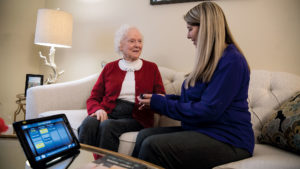
Lorien Health Services, whose robust telemedicine program and other innovative technologies help to provide the best care to every resident, was awarded the blue ribbon in the Quality category.
“Every Lorien employee sees our residents as somebody’s mom, somebody’s dad — somebody’s prized possession —and we had better take care of them,” explained Lou Grimmel, CEO of Maryland-based Lorien Health Services.
Thanks in large part to the telemedicine program, this year the Centers for Medicare & Medicaid Services ranked Lorien’s Bel Air, MD, facility in the first tier for value. The program, which first got underway in 2015 as a pilot project between the facility and the University of Maryland Upper Chesapeake Health Center, allows a resident, accompanied by a certified nurse practitioner, to see and talk to attending physicians at the hospital or emergency department.
It has resulted in a 34% reduction in 30-day hospital readmissions. Because of the program’s success, Lorien has expanded it to other facilities.
Among the company’s other advancements: It is rolling out a telehealth program for people outside its facilities through the Lorien at home health division. This program incorporates Lorien Link, which uses a tablet and connected peripherals, such as a blood pressure cuff, to gather patient data.
Other Quality winners:
• Banecare Management of Braintree, MA, received Silver for its data analysis on residents who are admitted to the hospital after being discharged from a skilled nursing facility. Using PatientPing technology, the organization can monitor patients when they are admitted to the hospital, work with the hospital in real time and direct patients back to skilled nursing facilities when appropriate.
• Westminster Skilled Nursing Facility in Muncie, IN, won Bronze for care coordination. After implementing Olio, a collaboration platform that connects acute- and post-acute facilities, it can communicate in real time on a resident’s condition and also connect leadership, nursing, social services and therapy to provide feedback to physicians and hospital teams.
From the December 2019 Issue of McKnight's Long-Term Care News





